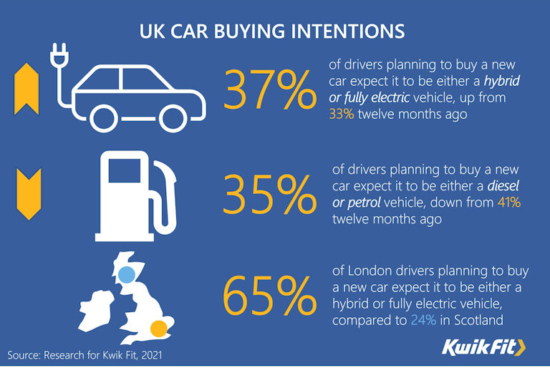Kwik Fit: More UK drivers considering EVs, investment in charging infrastructure essential

Electric vehicles account for a growing proportion of the UK car parc and will continue to do so in the years to come. This move from combustion power is a thrown gauntlet that garages and vehicle servicing firms need to pick up sooner rather than later, and also a transition that requires a visible investment in charging capabilities.
Research carried out on behalf of Kwik Fit shows a 32 per cent year-on-year rise in the number of drivers expecting their next car to be fully electric. When asked 12 months ago, just eight per cent of motorists anticipated changing over to full electric when dispensing with their current vehicles; today that figure is 11 per cent. While this still represents a minority of drivers, when throwing hybrid vehicles into the mix the number of drivers considering a low emission model as their next vehicle rises to 37 per cent, up from 33 per cent a year ago.
Hybrid or fully electric cars have overtaken petrol and diesel models as most drivers’ expected next vehicle in the last year. Research conducted for Kwik Fit in 2020 showed that the 33 per cent of drivers expecting their next car to be a low emission vehicle were outweighed by the 41 per cent who said their next car would have a petrol or diesel engine. This balance has been reversed, with the 37 per cent now stating that their next vehicle would be low emissions outstripping the 35 per cent likely to opt for a diesel or petrol model. Indecisiveness still grips more than a quarter of motorists, with 28 per cent of drivers saying they didn’t know, compared to 26 per cent a year ago.
Londoners most likely to consider EVs
Of all the UK regions, drivers in London are the most likely to be considering switching to either a hybrid or fully electric, with 65 per cent of drivers indicating this – a result that may reflect the cost of driving the ‘wrong’ vehicle within the soon to be expanded London Ultra Low Emission Zone. The second highest region is the North East, with 49 per cent, while the lowest is Scotland, where only 24 per cent say they are opting for a low emission motor in their next car.
Deterrents to going electric
Market research firm Opinium surveyed 4,006 “nationally representative” UK adults in June and July on behalf of Kwik Fit, which notes that the results suggest that a challenge awaits policy makers looking to encourage drivers to switch to electric as soon as possible.
According to the research, on average drivers expect to change their vehicle in 21.6 months. This average is higher for those expecting their next car to be electric – they plan to change their car in an average of 23.9 months, compared to 17.6 months for those opting for internal combustion models. And as mentioned, only 11 per cent of drivers planning to buy another vehicle are considering fully electric cars.
What factors are putting drivers off going full electric? Kwik Fit comments that while the greatest deterrent varies in some regions, overall, the lack of fast charging points is the most significant factor and is cited by 38 per cent of drivers not yet considering swapping to fully electric. This rises to 51 per cent among Welsh drivers and 50 per cent in Yorkshire. In the North East, South West, South East and Scotland, the increased cost over an equivalent petrol or diesel model is the greatest barrier. For drivers in the West Midlands and the East of England, their biggest concern is the perceived restrictions on range of electric cars.
Investing in EV capabilities
Kwik Fit states that it has been investing in its electric vehicle capabilities alongside the growth in the electric car parc and now has over 570 technicians qualified to work on these vehicles. It proudly calls this the largest electric vehicle qualified workforce in the automotive servicing sector. Although the pandemic caused some interruption to the company’s training programme, it is now back running at full capacity with the capability for around 40 technicians a month to become qualified on electric vehicles.
“This research shows that over the last twelve months car buyers appear to have passed a tipping point in the switch to electric cars,” says Roger Griggs, communications director at Kwik Fit. “However, although consideration of low emission models has overtaken that for petrol and diesel there is clearly still a lot to do to convince some drivers. Some barriers to consideration can be put down to misperception or a lack of up-to-date knowledge and the industry must work together to address those areas. But it is also vital that there is visible investment made in the charging infrastructure to ensure that drivers have the confidence to make the switch.
“At Kwik Fit we have been heavily investing in our EV capability to provide drivers with the reassurance that they will be able to get their car repaired across our network, whatever type of fuel it uses.”
Charging should be convenient & inexpensive
Griggs’ comments coincide with the Transport Committee delivering a set of recommendations to Government as the net zero deadline approaches. The Committee is adamant that a “postcode lottery” much be avoided: Chair Huw Merriman MP states that “charging electric vehicles should be convenient, straightforward and inexpensive and drivers must not be disadvantaged by where they live or how they charge their vehicles.”
The Committee stresses that with charging at home substantially cheaper than on-street charging, “pricing must be fair for people who charge their electric vehicles in public spaces.” It thus welcomes the Government’s commitment to regulate interoperability between charge points and pricing transparency for public charge points later this year. “However, mandating industry to use pricing to move consumer behaviour towards a ‘little and often’ refuelling habit will also help.”


 NTDA
NTDA
Comments